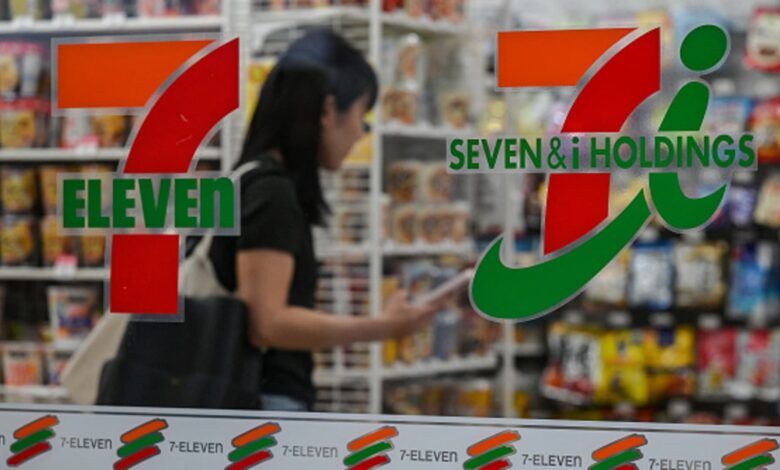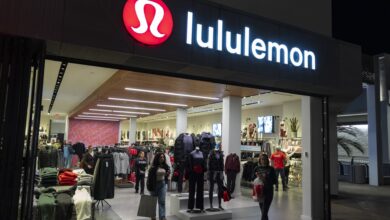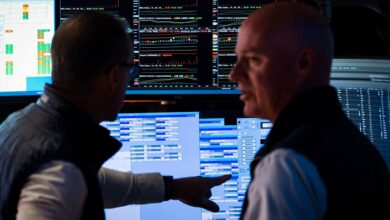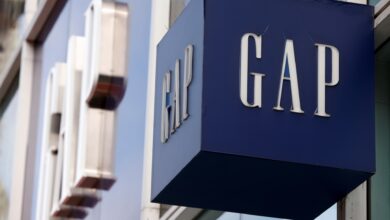7-Eleven’s parent company cuts full-year earnings forecast, presses ahead with restructuring

A customer is seen inside a 7-Eleven convenience store along a street in central Tokyo on September 9, 2024.
Richard A. Brooks | Afp | Getty Images
Japanese convenience retailer Seven & i Holdings slashed its earnings forecasts and pressed ahead with restructuring plans that include spinning off non-core businesses into a standalone subsidiary.
The company slashed its profit forecast for the fiscal year ending February 2025 and now expects net income of 163 billion yen ($1.09 billion), a 44.4% reduction from its prior forecast of 293 billion yen. The reduction comes as it reported first-half net profit of 52.24 billion yen on 6.04 trillion yen in revenue. While sales came in higher than forecast, profits significantly below its own guidance for 111 billion yen.
Seven & i said it saw fewer customers at its overseas convenience stores as they took a “more prudent approach to consumption.” The company noted it recorded a charge of 45.88 billion yen related to its spin-off of Ito-Yokado Online Supermarket.
In a separate filing, the owner of 7-Eleven said it will set up an intermediate holding company for its supermarket food business, specialty store and other businesses, amid growing pressure from investors to trim down its portfolio.
The restructuring, which would consolidate 31 units, comes as the Japanese retail group resists a takeover attempt by Canada’s Alimentation Couche-Tard.
In September, Seven & i rejected the initial takeover offer of $14.86 per share, claiming that the bid was “not in the best interest” of its shareholders and stakeholders and also cited U.S. antitrust concerns.
After receiving that proposal, Seven & i sought and obtained a new designation as “core business” in Japan. Under Japan’s Foreign Exchange and Foreign Trade Act, foreign entities need to notify the government and submit to a national security review if they are buying a 1% stake or more in a designated company.
Revised offer
Seven & i confirmed Wednesday that it received a revised bid from ACT, but did not disclose further details. Bloomberg previously reported that the Canadian operator of Circle-K stores had raised its offer by around 20% to $18.19 per share, which would value Seven and i at 7 trillion Japanese yen. If finalized, the deal could become the biggest-ever foreign takeover of a Japanese company.
Seven & i Holdings
It’s “entirely possible” that ACT’s buyout bid to turn into a hostile takeover attempt, Nicholas Smith, a Japan strategist at CLSA told CNBC’s “Squawk Box Asia” on Thursday. A hostile takeover occurs when an acquiring company attempts to gain control of the target company against the wishes of its management and board of directors.
“We’ve had a lot of problems with poison pills in Japan in recent years, and the legal structure is extremely opaque,” he added. Companies trying to shake off an acquirer may opt to deploy a “poison pill” by issuing additional stock options to dilute the attempted acquirer’s stake.
However, “an outright hostile tender offer would be highly unlikely,” in the view of Jamie Halse, founder and managing director of Senjin Capital, as no banks would be willing to provide the financing.
That said, if the offer gets to a “sufficiently attractive level,” he said it may be difficult for the board to continue to reject it.
“Shareholders are likely already frustrated that no further negotiations have taken place despite the increase in the offer price,” he said, adding that an activist investor may seek to “harness those frustrations” and “effect a change in the board’s composition.”
Seven & i shares were traded at 2,325 Japanese yen as of Thursday close. The Tokyo-listed shares have surged over 33% since the Canadian company’s buyout interest became public in August.
ACT has about 16,800 stores globally, far fewer than Seven & i Holdings’ approximately 85,800 stores.
The newly revised offer indicates ACT leaders are “committed,” Jesper Koll, head of Japan at Monex Group, told CNBC via email. He also pointed out that the new offer price suggests a 53% premium to where shares were trading before the initial offer.
“The money they offer is good, but there is more at stake than just numbers,” Koll said.
“I really can’t see ACT revising up its price tag,” Amir Anvarzadeh, a Japan equity market strategist at Asymmetric Advisors, told CNBC, “the pressure is on Seven & i management to prove that they can speed things up and stay independent.”




